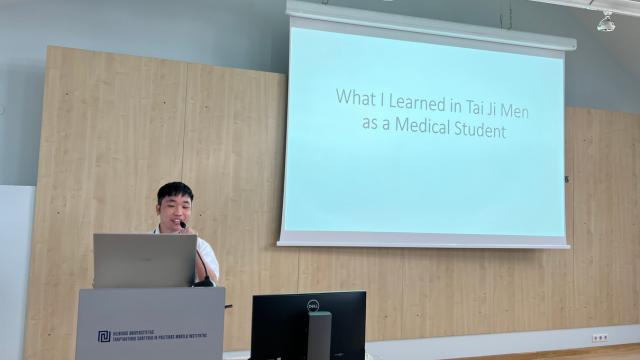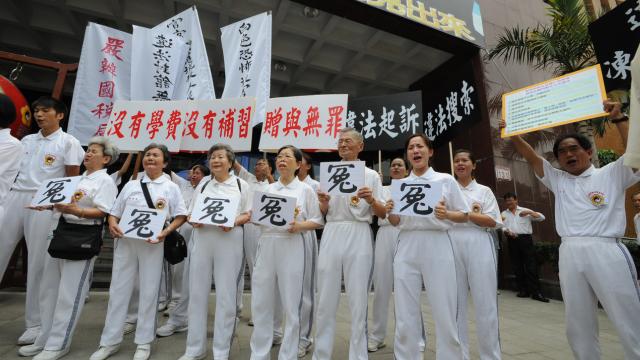Seeking a holistic approach to health care and caring for the patients’ happiness also helped me understanding the diseases affecting Taiwan’s tax system.
by Lu Yu-An*
*A paper presented at the CESNUR 2023 international conference, Vilnius, Lithuania, June 21, 2023.

I just graduated from a school of medicine a couple of weeks ago and will be starting my postgraduate year training in August. Respecting diverse cultural values plays a crucial role in healthcare. In my country, every physician must recite the physician’s oath in front of all teachers before entering the hospital and starting to participate in the active care of patients. The World Medical Association’s “Declaration of Geneva” includes a clear statement: “I will not permit considerations of age or disability, creed, ethnic origin, gender, nationality, political affiliation, race, social standing or any other factor to intervene between my duty and my patient.” This is consistent with the first principle of the preamble of the Universal Declaration of Human Rights—recognizing that “the inherent dignity of all members of the human family is the foundation of freedom, justice and peace in the world.”
During the internship, our teacher kept reminding us that we should always remember that we are treating a “person,” not only diseases, which is the concept of holistic health care. To put it simply, it is a patient-centered philosophy of integrated care, because health is built on the physical, social, psychological, and spiritual dimensions. Therefore, the entire health care team should pay attention to the various needs of the patient, not just treating the disease. In addition, the health care team must respect the patients’ culture, values, and beliefs to understand and meet their unique needs. In this way, patients receive better support and care during the treatment process, which contributes to maintaining their physical and mental balance and improving their quality of life.

I would like to share with you how I got onto the path of medicine. I grew up in Tai Ji Men, where I follow my Shifu (Grand Master) and brothers and sisters to participate in a significant number of charity and cultural events. When I was only five, I joined the activity “Education train of human rights for world citizens.” And then at ten, I participated in the promotion of the “Global online endorsement of the Declaration of human rights of world citizens and peace.” Recently, I have been working to promote the International Day of Conscience. My Shifu, Dr. Hong Tao-Tze, always told us that the more ways we find to save people, the better. It is because of such a growth process that I chose to become a doctor, since doctors can use their profession to protect the basic element of people’s happiness—health.
You have heard from other speakers in this panel how such a benevolent organization has been persecuted since 1996, and even ridiculously accused of “raising goblins.” About this absurd accusation, Kenneth Jacobsen, a professor of law at Temple University who is very familiar with the judicial and tax systems in both Taiwan and the United States, commented that, “It is not due process to accuse a human being in a civilized society of raising goblins. The mere statement of that would cause individuals and should cause individuals to question the insanity of the prosecutor and in any court of law, such an absurd allegation would be thrown out.”
Facing such a major human rights persecution, in addition to doing our best to achieve justice through the judicial system, we have also never stopped our efforts to promote conscience, love, and peace through cultural exchanges. We have continued to devote ourselves to thousands of charitable cultural performances to let the community know who we really are. For example, we participated in the National Day Show in front of Taiwan’s presidential palace to let the public know and feel the beauty of the national culture that has been passed down for generations. We participated in the Seattle Seafair Torchlight Parade in 1999. We were invited by the International Olympic Committee to perform at the 2000 Sydney Olympic Cultural Show. We were the only qigong group to perform in the Olympic competition area during the Olympic finals. In 2001, we went to Japan and won the 8th World Cup International Martial Arts Championships, obtaining the first place in the four categories of internal martial arts, external martial arts, qigong, and weapons, as well as the gold medal for the overall championship of martial arts performance.

I would also like to mention another aspect of our activity. Because of what happened to us, we studied the tax system of Taiwan and discovered that its problems, or diseases, are systemic. Our case is not unique.
The illegal tax bills issued by the National Taxation Bureau without conducting an investigation according to its authority have resulted in people falling into endless suffering. During the process of seeking administrative relief, we found that there are serious problems with the national tax relief system and even the tax authorities. For example, in Taiwan’s administrative tax relief system, the petitioners should pay one-third of the tax amount or provide a guarantee, or else their tax bills will be immediately enforced. They will even be restricted from leaving the country and may be charged and detained. This has already violated people’s personal freedom and freedom of movement in many cases.
Furthermore, according to some scholars’ analysis, the success rate of taxpayers in administrative litigation involving tax cases in Taiwan is only 6.11%. Even when citizens do win their cases, the administrative court does not make a final decision and sends the case back to the original agency for reexamination. Then the National Taxation Bureau can simply change the amount and issue another tax bill. The same vicious cycle of review, appeal, and litigation thus begins over again, as if illegal tax assessment can never die.
Taiwan’s administrative relief system is completely dysfunctional. One cause of this is the immoral system of bonuses, which tax bureaucrats pocket when, rightly or wrongly, they manage to enforce a tax bill.

The Tai Ji Men case is a demon-spotting mirror for the legal and tax systems. As we seek vindication, I thought of the great Tang Dynasty physician Sun Simiao, who said in his book, “In ancient times, those who cured the country were considered at the top level of medicine, those who cured people were in the middle, and those who cured diseases at the bottom.” Seeing that the legal and tax system and some corrupt bureaucrats in Taiwan have caused suffering to the people and hindered the development of the country, what we are doing is to use our personal pain to help others not to suffer the same pain again, and to help the government to reform and make the country a better place.
I just graduated from medical school, and it takes a very long training process to become a doctor who can be on his own, but I am willing to do it because once I succeed, I will be able to work as an individual and as part of a team to protect one of the basic elements of people’s happiness, their health.
This is what I learned from growing up in Tai Ji Men. Similarly, Tai Ji Men Shifu and dizi adhere to the rule of law and uphold justice not only for themselves. Once we succeed in our efforts at tax and legal reform, we can protect the well-being of the people living in Taiwan and establish a good society under the rule of law.
Source: Bitter Winter

